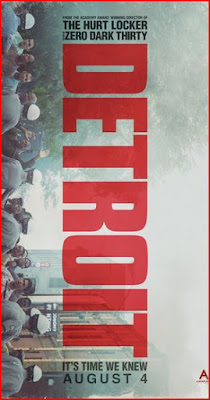If you have a good-sized used bookstore in your town, you might find a paperback copy of John Hersey's 1968 best-seller The Algiers Motel Incident, a report on the events at the center of Kathryn Bigelow's new film. So when the ads claim that Detroit is telling an untold story, what they really mean is "Tis new to thee." And yet I suspect that it will not seem new, nor old, to most audiences -- only all too familiar. Bigelow's film is the nearest thing I can think of to an American counterpart of Paul Greengrass's docudrama Bloody Sunday. In its first act (of three), Bigelow approximates Greengrass's pseudo-verite style, immersing us in the buildup to the 1967 Detroit riots with jumpy immediacy, with great help from her Zero Dark Thirty editor, William Goldenberg. Over time, we are introduced to the characters who will converge on the Algiers Motel, including the members of the Dramatics, an aspiring soul act whose gig at the Fox Theater is abruptly cancelled by the riots; a reckless cop (Will Poulter) who's allowed back on the streets after shooting a looter in the back despite orders not to fire at looters; and a security guard (John Boyega) whose uniform gives him some immunity from suspicion on the part of white police and National Guard troops.
At the Algiers, where the Dramatics crash after their disappointment, we meet a pair of white girls (Kaitlyn Dever and Hannah Murray) and Carl Cooper (Jason Mitchell), tenant who puts a scare into the other guests by staging a parody of police interaction with blacks while waving a gun at his "suspect." He seems a crazy man when he actually opens fire, but it was all a gag and his gun was just a starter's pistol. It's also just a gag, though it proves him really crazy, when Carl decides to fire the starters' pistol at National Guard troops across the way from the motel. The bad cop (given a fictional name) is one of the officers responding to the shot, while the security guard, practiced at defusing racial tensions, lends his aid. The cop promptly shoots Carl in the back without knowing whether he was the gunman or not. The rest of the night is a nightmare for the motel guests as the cops, with the uncertain backing of the National Guard, line them up against a wall, demanding that someone identify the gunmen in the shooting most didn't even see. Impatient and keyed up, and with nothing to lose, apparently, after his misadventure earlier in the day, the cop threatens the guests, including the two white girls, with immediate execution if they don't cooperate. He's actually playing a good cop-bad cop game, but there are no good cops in sight. One by one, he has suspects taken into separate rooms, telling his men to kill them if they don't talk. Twice over, the other terrified guests hear a gunshot, but we see that the interrogators are firing into the floor or ceiling, meaning only to scare the people left in the hallway into telling whatever they might know, while their prisoners are instructed to lay quietly "or the next one will be real." Unfortunately, a rookie cop in the group is unfamiliar with this procedure and takes the bad cop's orders literally.
Detroit's second act is a horror movie climaxing in the second killing, masterfully set up by Bigelow and writer Mark Boal with the earlier fakeout scenes, with great help from Jack Reynor, the actor playing the babyfaced cop. The naive seriousness on his face tells you to expect something terrible this time, while Bigelow lets your imagination do the work by having the shooting done offscreen, behind closed doors. Poulter is a true monster in these scenes, as vicious toward the white girls (whom he assumes to be prostitutes) as toward the black men. His character is one you want to see get his comeuppance, but Detroit's third act turns into one of the most deliberately infuriating courtroom dramas in American film. I won't spoil the ways in which a seemingly airtight cases against the cops is picked apart; each new viewer should experience them as fresh slaps in the face. Such is history, though it can be argued that Bigelow and Boal cheat by juxtaposing the historic acquittal of the cops with their admittedly-conjectural account of events (one of the white girls was a technical advisor), which is presented with more obvious certainty, thanks to directorial omniscience, than was possible in court. More scrupulously, they show the survivors undercutting their own credibility at times, as when Boyega's security guard, himself a suspect in the killings, claims that he didn't arrive at the motel until all the victims had been killed. Because Detroit is likely to be inflammatory, depending on how well it performs at the box office, we should expect a backlash emphasizing the film's deviations from fact or dismissing it as Black Lives Matter propaganda. Yet it seems indisputable that injustice was done, by cops, at the Algiers Motel, and in court, where the culpable men get away on the sort of technicalities and lawyer tricks that in a different context would enrage any reactionary critics of this film. In 2017 it may be impossible to watch a film with Detroit's subject matter without bringing in some form of prejudice, but all sides should agree that Bigelow does a virtuoso job pushing her audience's hot buttons. Like Christopher Nolan with Dunkirk, she succeeds in making old news freshly visceral and menacing for today's moviegoers.

No comments:
Post a Comment